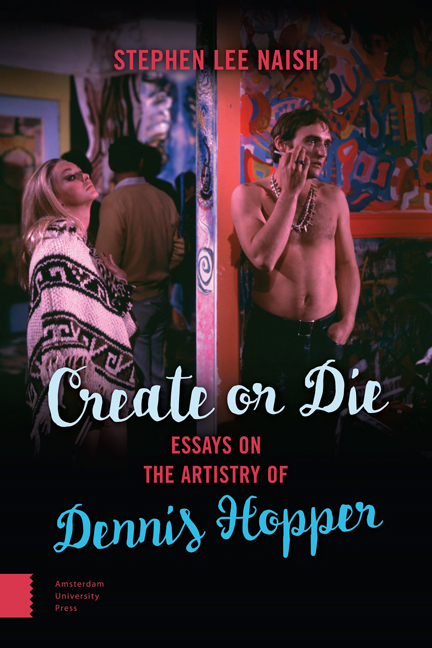Book contents
- Fronmatter
- Dedication
- Contents
- Introduction
- Scenes from a Revolutionary Life: How Dennis Hopper Conquered the American Century
- Hip-Hopp: Dennis Hopper and Music
- The Elephant in the Room: Dennis Hopper and American Politics
- Love and Hate: The Conflict of Emotions in The Blackout and Carried Away
- Commercial Breakdown: Dennis Hopper in the World of Advertisements
- White Light/White Heat: Actor and Character Collide in White Star
- Double Standards: The Art and Photography of Dennis Hopper
- Coda: The Fourth Wall
- Acknowledgements
- Notes
- Bibliography
The Elephant in the Room: Dennis Hopper and American Politics
Published online by Cambridge University Press: 11 December 2020
- Fronmatter
- Dedication
- Contents
- Introduction
- Scenes from a Revolutionary Life: How Dennis Hopper Conquered the American Century
- Hip-Hopp: Dennis Hopper and Music
- The Elephant in the Room: Dennis Hopper and American Politics
- Love and Hate: The Conflict of Emotions in The Blackout and Carried Away
- Commercial Breakdown: Dennis Hopper in the World of Advertisements
- White Light/White Heat: Actor and Character Collide in White Star
- Double Standards: The Art and Photography of Dennis Hopper
- Coda: The Fourth Wall
- Acknowledgements
- Notes
- Bibliography
Summary
An icon of the counterculture and an activist during the social upheaval of the 1960s, Dennis Hopper was, according to himself, “probably as Left as you could get without being a Communist.” Nevertheless, in the early 1980s, he switched political allegiances and began supporting the Republican Party. This change came just as the right-wing administration of Ronald Reagan came to power in 1981. Hopper admitted: “I’ve been a Republican since Reagan. I voted for Bush and his father. I don't tell a lot of people, because I live in a city where somebody who voted for Bush is really an outcast.” The city in question was Los Angeles, California, a state that George W. Bush lost to Democratic nominee Al Gore in the 2000 election (although his father, George Bush Senior, enjoyed a better result in the 1988 election campaign). Reagan's administration signified a radical shift in internal and external policies. As outlined in Leonard Quart and Albert Auster's book American Film and Society Since 1945 (1991), “Reagan's political ‘philosophy’ was built around aggressive anticommunism and an antagonism to big government and the welfare state.” The new government also debased the anti-war and anti-capitalist movements of the 1960s and 1970s that Hopper personally championed, and scaled back domestic spending on welfare assistance programmes, health care, and income support. Reagan expanded America's nuclear arsenal and military capacity in an effort to confront the Soviet Union under his rigorous spending policy of peace through strength, which was ultimately the flexing of American muscle in the face of an economically weakening Soviet Union. The policy was seen as a success and led to the end of the Cold War and the dismantling of the Soviet Union, leaving America, for good or ill, as the leading economic and militaristic power in the world. Reagan also began a policy of deregulating the banks and supporting free market capitalism, which ushered in “a culture of unbridled greed and materialism—where lining your pocket was the primary goal.” It has been argued that this culture of greed saw its pinnacle outcome in the financial crash of 2008 and the subsequent years of austerity that still prevail in some cities in the United States.
- Type
- Chapter
- Information
- Create or DieEssays on the Artistry of Dennis Hopper, pp. 51 - 58Publisher: Amsterdam University PressPrint publication year: 2016



